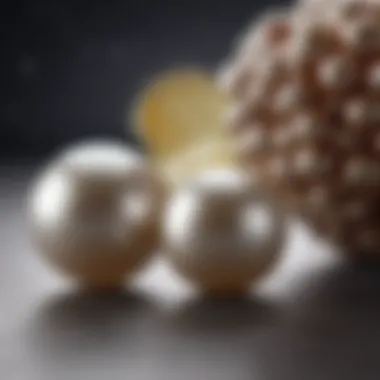Master the Art of Recognizing South Sea Pearls: A Comprehensive Guide


Identifying South Sea Pearls
South Sea pearls are among the most luxurious and coveted gems in the world, known for their exceptional size, luster, and unique colors. These pearls are cultivated in the warm waters of the South Seas, particularly in Australia, Indonesia, and the Philippines. The distinguishing feature of South Sea pearls is their large size, ranging from 9mm to 20mm, with a characteristic smooth surface and rich, satiny luster.
Characteristics of South Sea Pearls
When identifying South Sea pearls, it is crucial to consider their size, shape, color, luster, surface quality, and origin. South Sea pearls exhibit a range of colors, including white, silver, and gold, with overtones of rose, silver, or green. The surface should be free of blemishes or imperfections, reflecting a high level of quality and rarity. Moreover, the luster of South Sea pearls is renowned for its deep, inner glow, a result of the nacre layers deposited by the oyster over time.
Genuine vs. Imitation Pearls
Distinguishing between genuine South Sea pearls and imitation pearls requires a keen eye and attention to detail. Genuine South Sea pearls have a unique warmth and weight to them, unlike imitation pearls that may feel artificial or lightweight. Furthermore, genuine pearls will demonstrate a natural iridescence and warmth against the skin, while imitations may appear uniform in color and lack depth. Consulting with a reputable jeweler or gemologist can help verify the authenticity of South Sea pearls and ensure a wise investment.
Cultivation Process
Understanding the cultivation process of South Sea pearls sheds light on their rarity and value. South Sea pearls are primarily cultivated through the Pinctada maxima oyster, which produces pearls of exceptional quality and size. These oysters are nurtured in pristine marine environments, allowing them to develop the lustrous nacre layers that give South Sea pearls their distinctive beauty. The cultivation process is meticulous and time-consuming, with each pearl requiring several years to develop fully.
Overall, identifying South Sea pearls involves a blend of appreciation for their natural allure, attention to detail, and knowledge of their unique characteristics. By mastering the distinct features of these exquisite gems, enthusiasts and collectors can confidently assess the quality and authenticity of South Sea pearls, ensuring a valuable addition to their jewelry collection.
Introduction
In the realm of fine jewelry, South Sea pearls are revered for their unparalleled beauty and rarity. This article aims to serve as a comprehensive guide on how to authentically identify these exquisite gems. Understanding the nuances of South Sea pearls is crucial for gemstone enthusiasts, collectors, jewelry designers, and geology enthusiasts alike. By delving into the specifics of their origin, cultivation, value, and significance, readers will gain invaluable insights into the world of these coveted pearls.
Overview of South Sea Pearls
Origin and Cultivation


The origin and cultivation of South Sea pearls play a pivotal role in their desirability and prestige. Sourced from the pristine waters of the South Seas, these pearls are meticulously nurtured within the oysters for an extended period, resulting in larger pearl sizes and exquisite luster. The unique marine environment of the South Seas imparts a distinctive silky texture and radiant glow to these pearls, setting them apart from other varieties. The rarity of South Sea pearls lies in their limited geographic range and the intricate process involved in their cultivation, making them a prized choice for connoisseurs seeking exclusivity.
Value and Rarity
The value and rarity of South Sea pearls stem from their unparalleled beauty and scarcity in the market. Renowned for their exceptional size and shimmering luster, these pearls command a premium price due to their limited supply and high demand. The natural hues of South Sea pearls range from creamy whites to deep golden tones, adding to their allure and sophistication. Their rarity is further accentuated by the stringent quality standards set by pearl experts, ensuring that each South Sea pearl is a rare and precious treasure coveted by discerning jewelry aficionados.
Significance of Identifying South Sea Pearls
Authenticity and Quality Assessment
Authenticity and quality assessment are paramount when it comes to South Sea pearls. Distinguishing genuine pearls from imitations requires a keen eye and in-depth knowledge of their unique characteristics. By understanding the telltale signs of authenticity such as surface texture, luster, and overtone, one can ensure the investment in a genuine South Sea pearl of exceptional quality. Quality assessment encompasses factors like roundness, lack of blemishes, and uniform color distribution, which contribute to the overall value and desirability of these prized pearls.
Market Demand and Pricing
The market demand for South Sea pearls continues to soar, driven by the growing appreciation for their unmatched beauty and intrinsic value. As consumer preferences shift towards luxury items with a timeless appeal, South Sea pearls have emerged as a coveted choice in the world of fine jewelry. The pricing of these pearls is influenced by factors such as size, shape, surface quality, and color intensity, reflecting their rare and exquisite nature. Understanding the dynamics of market demand and pricing trends is essential for both buyers and sellers in navigating the nuanced landscape of South Sea pearl transactions.
Physical Characteristics
Size and Shape
Comparison to Other Pearl Types:
When comparing the Size and Shape of South Sea pearls to other pearl types, it becomes evident why they are highly esteemed in the world of gemstones. South Sea pearls are renowned for their larger size and perfect round or near-round shapes, setting them apart from freshwater or Akoya pearls. This unique characteristic contributes to their allure and desirability among collectors and connoisseurs.
Color and Luster


Natural vs. Enhanced Colors:
The Color and Luster of South Sea pearls are a crucial aspect in their identification process. Natural colors in South Sea pearls showcase a mesmerizing range of overtones, including ivory, silver, and gold, emanating a luxurious glow. On the other hand, Enhanced Colors may undergo treatments to intensify or alter their hue, affecting their overall value and authenticity. Understanding and discerning between natural and enhanced colors is vital for distinguishing genuine South Sea pearls.
Surface Quality
Blemishes and Imperfections:
Examining the Surface Quality of South Sea pearls involves a meticulous inspection of blemishes and imperfections that may impact their value and appeal. While minor surface irregularities are common in natural pearls and may attest to their authenticity, extensive blemishes can diminish their quality. Identifying and evaluating blemishes and imperfections allow collectors and buyers to make informed decisions regarding the quality and pricing of South Sea pearls.
Visual Inspection Techniques
Visual inspection techniques play a crucial role in this comprehensive guide on identifying South Sea pearls. By employing visual inspection, individuals can closely examine key characteristics that distinguish South Sea pearls from other types. This section delves into the significance of visual inspection in assessing the quality and authenticity of these coveted gems. Examining factors such as luster, surface quality, and color through visual inspection provides valuable insights into the unique attributes of South Sea pearls.
Light and Reflection
Testing the Surface Shine
Testing the surface shine of South Sea pearls is a critical aspect of visual inspection techniques. By evaluating how light interacts with the pearl's surface, experts and enthusiasts can gauge the pearl's luster and quality. The surface shine test helps in determining the level of reflection and brilliance exhibited by the pearl, highlighting its beauty and radiance. This method aids in distinguishing between natural and enhanced pearls based on the intensity and consistency of the surface shine. Understanding the nuances of surface shine testing is essential for accurate assessment and appreciation of South Sea pearls.
Magnification and Texture Analysis
Identifying Surface Irregularities
Analyzing surface irregularities through magnification and texture analysis is an indispensable component of visual inspection techniques. By zooming in on the pearl's surface, inspectors can detect minute imperfections and blemishes that may impact its overall value. Identifying surface irregularities allows for the assessment of the pearl's authenticity and quality, as natural pearls exhibit unique textures and patterns under magnification. This method enables enthusiasts to appreciate the intricacies of South Sea pearls while ensuring an accurate evaluation of their surface integrity and purity.


Density and Weight Assessment
In the realm of identifying South Sea pearls, the process of Density and Weight Assessment holds a pivotal role. This section sheds light on the significance and methodology involved in evaluating the density and weight of these precious pearls. By understanding the density and weight properties, gemstone enthusiasts, collectors, jewelry designers, and geology enthusiasts can effectively discern the authenticity and quality of South Sea pearls with precision and accuracy.
When delving into Density and Weight Assessment, key elements come into play. The density of a pearl is typically measured by its specific gravity, which is crucial for differentiating real pearls from fakes. By observing the weight of a pearl in relation to its volume, experts can ascertain the density and determine whether the pearl aligns with the expected properties of authentic South Sea pearls.
Specific to this article, the examination of density and weight adds substantial value to the overall discussion on identifying South Sea pearls. Through this assessment, readers can grasp a deeper understanding of the physical characteristics that distinguish genuine pearls from imitations. The meticulous consideration of density and weight provides a scientific approach to validating the authenticity of South Sea pearls, enhancing the reader's proficiency in gemstone evaluation.
Specific Gravity Measurement
The standout characteristic of Specific Gravity Measurement lies in its ability to provide a quantitative measurement that aids in the verification of pearl authenticity. This approach offers a reliable means to identify genuine South Sea pearls based on their unique density characteristics, distinguishing them from counterfeit counterparts. Through Specific Gravity Measurement, this article elevates the discussion on pearl assessment, offering a robust method for enthusiasts to validate the legitimacy of their prized gemstones.
Professional Testing Methods
In the realm of identifying South Sea pearls, the utilization of professional testing methods holds utmost significance. These methods serve as a critical step in distinguishing between authentic South Sea pearls and imitations, ensuring the quality and value of these coveted gems. By delving into X-ray examinations and cultivation information verification, gemstone enthusiasts and jewelry designers can gain a deeper understanding of the authenticity and intrinsic characteristics of South Sea pearls.
X-ray Examination
Interior Structure Analysis
Interior structure analysis through X-ray examination plays a pivotal role in elucidating the composition and quality of South Sea pearls. This meticulous approach involves penetrating the layers of the pearl to unveil its innermost components, such as the concentric layers of nacre and any potential irregularities. By scrutinizing the intricate internal structure, experts can discern the authenticity and craftsmanship of the pearl, ensuring it meets the stringent standards of genuine South Sea pearls.
Certification and Documentation Review
When it comes to cultivation information verification, the scrutiny of certifications and documentation is imperative in confirming the provenance and authenticity of South Sea pearls. Through rigorous examination of official certificates and accompanying documents, stakeholders can verify essential details such as origin, harvest date, and quality assessments. This review process acts as a safeguard against fraudulent practices, providing clarity and assurance to buyers and collectors seeking genuine South Sea pearls for their jewelry creations.
Conclusion
Key Takeaways
Enhanced Understanding of South Sea Pearls
Enhanced understanding of South Sea pearls comes through careful examination of their physical characteristics, such as size, shape, color, luster, surface quality, density, and weight. This detailed analysis allows for distinguishing South Sea pearls from other types of pearls, establishing their rarity, value, and authenticity. By grasping the significance of each aspect in identifying South Sea pearls, enthusiasts gain a deeper appreciation for these prized gems. The meticulous attention to detail required to assess South Sea pearls elevates the overall understanding of gemology, appealing to collectors and geology enthusiasts interested in the intricacies of these exquisite jewels.







